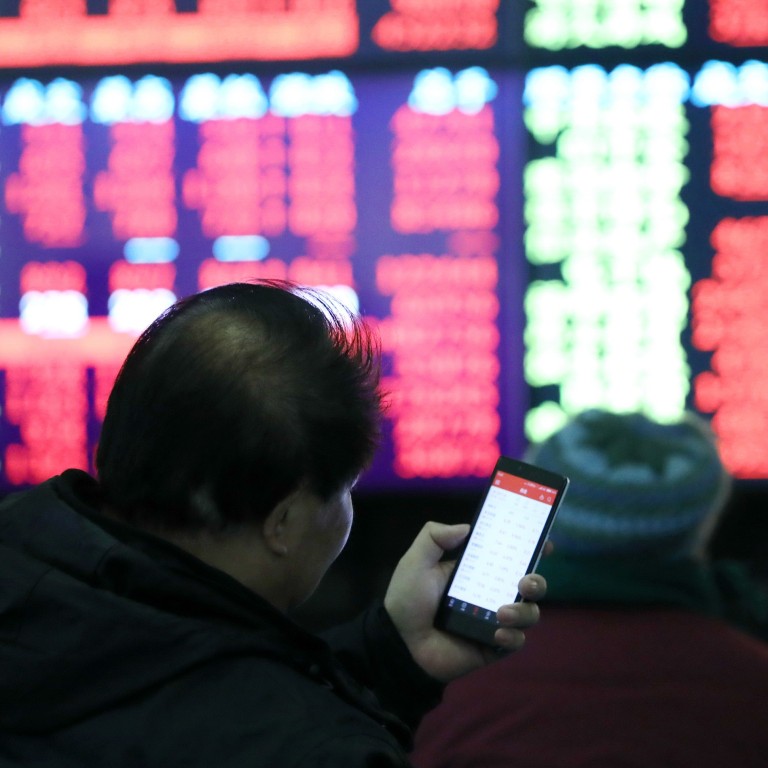
Index compiler MSCI plans to quadruple weighting of Chinese stocks in its global benchmarks
- Implementation will be carried out in three steps, with full weighting in effect by November
- Larger presence shows that despite trade war, corporate governance issues and stock volatility, China’s capital markets continue to attract foreign investors
Index compiler MSCI said it will quadruple the representation of Chinese stocks in its global benchmarks and add an array of mid- and small-caps, a move that may add further fuel to the world’s best-performing equity market this year.
The inclusion factor, or the adjusted free-float cap, of yuan-traded A shares will be raised to 20 per cent from the current 5 per cent in MSCI’s indexes by November, with the increase being made in three steps, the New York-based index compiler said in a statement on Friday in China.
With full implementation, Chinese stocks will account for a 3.3 per cent of the weighting of the MSCI Emerging Markets Index. Meanwhile, 168 mid-cap stocks and 27 small-caps on the ChiNext index will be added to MSCI’s indexes for the first time, according to the statement.
The surge in the weighting demonstrates that despite Beijing’s trade disputes with the US, questions of corporate governance and even the volatility of Chinese shares, China’s capital markets continue to attract foreign investors. The benchmark Shanghai Composite Index entered a bull market this week after a 20 per cent gain, making a quick turnaround from the worst-performing benchmark globally last year. China’s markets have also regained the title of the world’s second largest, eclipsing Japan.
Harvest Global Investments and UBS Group say the year of 2019 will see hefty foreign inflows to Chinese stocks, predicting the decision made by the MSCI will lead to inflows ranging between US$70 billion and US$100 billion The UK-based FTSE Russell, which rivals MSCI, will also start to add mainland stocks to its benchmarks starting in June.
MSCI first included Chinese stocks, known as the A-share market, in its benchmarks in June after making the rejection three times. An exchange link with Hong Kong and a lift in the daily quota available to foreign investors have made it easier to invest in Chinese shares.
“Global investors are still very underweight China and, if the market continues to perform well, they will all have to rush to increase their exposure at the same time,” said Yannan Chenye, a portfolio manager at Harvest Global. “We expect international capital to have a major effect on the A-share market and its valuation metrics over the years ahead.”
Foreign buying ahead of the MSCI decision was attributed with helping recent gains in the Shanghai Composite, which has jumped 18 per cent so far this year.
The inclusion factor of Chinese stocks in MSCI’s gauges will increase to 10 per cent in May, 15 per cent in August and 20 per cent in November, Friday’s statement said. Upon the three-step implementation, the MSCI Emerging Markets Index will have 253 Chinese large-caps, 168 mid-caps and 27 ChiNext stocks, it said.
The MSCI move came after a five-month consultation with global fund managers. During the period, the Chinese authorities took a spate of measures address some of foreign investors’ major concerns. The Shanghai and Shenzhen exchanges tightened rules to prevent lengthy trading suspensions by listed companies and the securities regulator expanded the investment scope for offshore investors.
“The strong commitment by the Chinese regulators to continue to improve market accessibility is another critical factor that has won the support of international institutional investors,” said Remy Briand, managing director and chairman of MSCI’s index policy committee.
A future plan to further lift the weighting of Chinese stocks will require the regulators to overcome other hurdles, such as restrictions on access to hedging and derivatives instruments, the short settlement cycle and the trading holidays of the exchange link, said MSCI.

